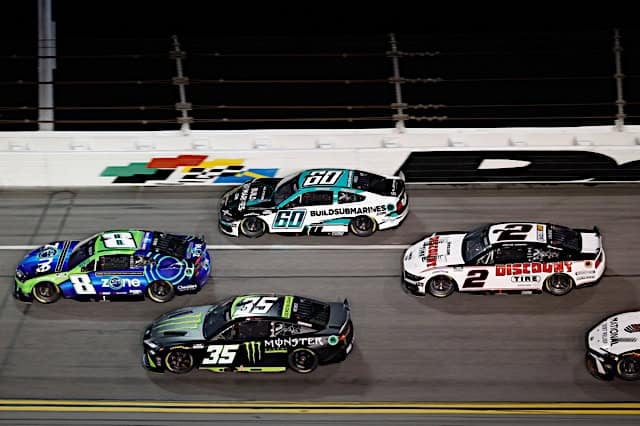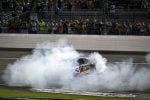Well, here we are. Time flies, and suddenly, 25 NASCAR Cup Series races are behind us in 2025. Fourteen different drivers have tasted the champagne in victory lane, and this Saturday (Aug. 23) night, the 16-driver playoff field will be set at Daytona International Speedway when the checkers fall on the Coke Zero 400.
While it’s not unusual for a driver or two outside the top 16 in season points to make the playoff field, this year there are three, and one of them, Shane van Gisbergen, has racked up four wins. Josh Berry and Austin Dillon also have the wins that punch their playoff tickets.
Meanwhile, there are three more winners inside the top 16 but outside the top 10 in points, including defending Cup champion Joey Logano.
All of this boils down to the fact that there are just two spots left in the playoffs, and, with the unpredictability of Daytona, just about everyone in the field has a shot at the trophy.
The two winless drivers currently in position to take the last two spots if there is no new winner are Tyler Reddick and Alex Bowman. Neither has a Cup Series win at Daytona. Reddick has wins there in both the NASCAR Xfinity and Craftsman Truck Series; Bowman has never won at Daytona, or any other superspeedway, for that matter. And even with those other wins, Reddick has struggled at Daytona in a Cup car, with three top fives in 12 starts and an average finish of 23rd, while Bowman’s 14.7 average is second among active Cup drivers, but he needs a win to stay safe.
If there is no new winner, or things get weird and there is one but he’s one of the four part-timers entered (which is not completely out there with Xfinity Series superspeedway ace Austin Hill in the field), Reddick and Bowman will both secure their spots by starting the race.
If either of them wins, the other will get the final points spot.
If there’s a new winner, all bets are off, and again, this is Daytona, so while off-the-wall winners are pretty rare, it’s entirely possible that someone like Kyle Busch or Ricky Stenhouse Jr. could swoop in and take it. Harrison Burton did it last year.
Reddick has a 29-point cushion over Bowman, which seems pretty solid, but again, Daytona. If he has an early exit or a terrible night, Bowman could get by him and oust him if there is a new winner.
And all of this, while it will make the race seem exciting, really just feels wrong.
It’s one thing to see an underdog race his way into the playoffs, but it sits differently when the drivers who stand to lose are currently seventh and ninth in points.
It’s hard to finish in the top 10 in points throughout a season. It may not take multiple wins, but it takes incredible consistency. When a full season’s worth of races determined the champion, finishing in the top 10 was a noteworthy accomplishment. There are winning drivers who have never achieved it.
The playoff system was designed to reward consistency during the regular season as well as wins, but in practice, it falls short. Bowman has had some bad luck that hurt his overall consistency, but he still has more top 10s than his teammate William Byron, who has already wrapped up the regular season championship. That he should relinquish a playoff spot to a driver with one top five that just happened to be a win doesn’t sit well.
This is why longtime fans, who were around for full-season titles, think playoff titles are cheap. Yes, it’s unlikely that Dillon, Berry or even van Gisbergen with his four wins will go deep enough in the playoffs to make a real run at anything, but at the end of the day, a driver who had a better season, possibly a top-10 season, won’t even be mentioned at the season banquet.
Now, many of those same longtime fans would argue that a seventh or a ninth-place driver shouldn’t win the title either. Fair enough; they aren’t wrong. But that driver who was in the top 10 all year should not be ignored because the 25th-place guy had one good week.
That’s why, as ill-conceived as it was, the 10-race Chase was still better than what’s in place now. The 10 (which was later expanded but still worked under the same principle) drivers who made it in were at least the 10 best drivers of that year. The order might have changed after the reset, but drivers in the back half of the field didn’t have a seat at the table. Teams still played it differently than a full-season title, but the best driver all year had a fair shot at the title and didn’t finish far lower in the standings than he deserved because of one or two bad races. He might have lost a title, but he wasn’t eliminated from contention for a rocky start and could finish based entirely on his own merit over the 10-race span.
There’s an old adage in racing that sometimes, it’s better to be lucky than good. That’s true, and it’s no small thing if good luck plays out for a race win. Fewer than 10 drivers to race in the Cup Series have won races. A win in itself is an extraordinary achievement at this level. And it should be enough of a reward to a driver who isn’t consistently a contender.
But something is rotten when drivers who have been in the top 10 in points after 25 weeks have to worry if they will have the opportunity to even finish in the top 16 after the season. All that does is strengthen fans’ belief that a championship under this system is cheap, far less than the value of a full-season title, a belief which, while valid, is unfair to a generation of drivers who won titles under the rules they were given. They didn’t choose the system or its consequenses.
A new winner at Daytona would be exciting. It would be a fitting climax to the final race of the regular season that’s engineered for maximum chaos. But it wouldn’t be good for the sport.
Amy is an 20-year veteran NASCAR writer and a six-time National Motorsports Press Association (NMPA) writing award winner, including first place awards for both columns and race coverage. As well as serving as Photo Editor, Amy writes The Big 6 (Mondays) after every NASCAR Cup Series race. She can also be found working on her bi-weekly columns Holding A Pretty Wheel (Tuesdays) and Only Yesterday (Wednesdays). A New Hampshire native whose heart is in North Carolina, Amy’s work credits have extended everywhere from driver Kenny Wallace’s website to Athlon Sports. She can also be heard weekly as a panelist on the Hard Left Turn podcast that can be found on AccessWDUN.com's Around the Track page.





